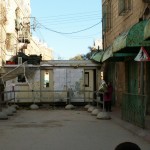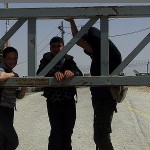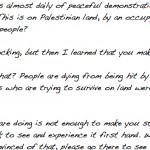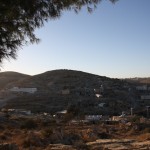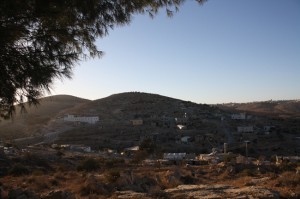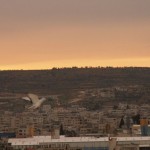
ISRAELI SOLDIERS DETAIN FIVE PALESTINIAN SCHOOL BOYS IN SOUTH HEBRON HILLS
[Note: According to the Fourth Geneva Convention, the Hague Regulations, the International Court of Justice, and several United Nations resolutions, all Israeli settlements and outposts in the Occupied Palestinian Territories are illegal. Most settlement outposts, including Havat Ma’on (Hill 833), are considered illegal also under Israeli law.]
November 21st, 2010
At-Tuwani – Christian Peacemaker Teams Press Release: Claiming that the children were throwing stones, Israeli soldiers detained five Palestinian schoolboys.
Since the beginning of 2005, the children from the village of Tuba wait every morning for an Israeli army escort to accompany them to the school in At-Tuwani, along the shortest road that goes through the Israeli settlement of Ma’on and the illegal outpost of Havat Ma’on. The escort’s task is to protect the children from the violence of the Israeli settlers of Havat Ma’on.
On the morning of November 21st, Palestinian schoolchildren had been waiting for over an hour near the settlement chicken barns when, at about 8:50 am, the soldiers arrived to escort the children to school past Havat Ma’on. Instead of escorting the children, however, the soldiers stopped and talked with the settlement security guard while the children waited on the road nearby. While the soldiers and the security guard were talking, two settlers passed the children.
After waiting for 15 minutes, two of the schoolchildren left for school on their own, unaccompanied. The other 13 children waited for another five minutes, then turned around and left to head back home. The soldiers remained with the security guard.
As the children were arriving at their villages of Tuba and Maghayir Al-Abeed, the same soldiers drove up, and, shoving away two internationals from Christian Peacemaker Teams, grabbed five boys and put them in the army vehicle. The soldiers took the boys back to the settlement barns, where, according to the children, they asked them no questions, but made them sit against a barn. After holding them for 15 minutes, the soldiers released the boys.
As the boys were leaving, the captain told the internationals “tell the children’s parents that if the boys throw stones again, it won’t be like this time. There will be problems.”
“I was waiting with the kids for over an hour, and I never saw them throw stones” said Joe Yoder, member of CPT. “Even if they were throwing stones while they were playing around, I don’t see how that’s an offense that merits soldiers coming into their home and carrying them off like criminals. If the army would just arrive on time, then there wouldn’t be a problem in the first place.”
Schoolchildren from Tuba and Maghayir al Abeed rely on the Israeli army to escort them past the settlement of Ma’on and the illegal outpost of Havat Ma’on, where Israeli settlers have committed acts of violence against the schoolchildren in the past.
These kinds of incidents are the evidence of the Israeli military escort’s failure to protect the children from settler’s violence. In the last school year, the children were attacked 19 times, they waited for the escort 53 hours and they missed almost 27 hours of classes.
A more detailed report about the military escort of schoolchildren in South Hebron Hills will be published in the next few weeks.
Christian Peacemaker Teams and Operation Dove have maintained an international presence in At-Tuwani and South Hebron Hills since 2004.
